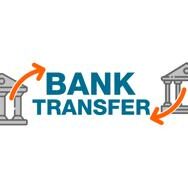2020 Chevrolet Express Blue
Specs:
Trim: 2500
Interior color: Medium Pewter
Exterior color: Blue
Mileage: 17663
Engine: Vortec 6.0L Flex Fuel V8 341hp 373ft. lbs.
Transmission: 6-Speed Shiftable Automatic
Vin: 1GCWGAFG1L1221153


$27,500.00
Fuel tank size: 31 gal
Fuel type: Gasoline
Drive: Rear-Wheel Drive
Engine: 276 hp 4.3L V6
Horsepower: 276 hp
2020 Chevrolet Express Blue
Specs:
Trim: 2500
Interior color: Medium Pewter
Exterior color: Blue
Mileage: 17663
Engine: Vortec 6.0L Flex Fuel V8 341hp 373ft. lbs.
Transmission: 6-Speed Shiftable Automatic
Vin: 1GCWGAFG1L1221153
A bank transfer is a method of moving money from one bank account to another, either within the same bank or between different banks. This process can be executed online, via mobile banking, over the phone, or in person at a bank branch. Bank transfers are widely used for both personal and business transactions due to their convenience and security.
There are several types of bank transfers, particularly in the UK:
To initiate a bank transfer, the sender must provide specific details about the recipient's account, including:
The sender instructs their bank to process the transfer, which then communicates with the recipient's bank through a clearing house to complete the transaction. Most banks have limits on how much can be transferred in a single transaction or within a day.
Bank transfers are generally considered safe; however, they are susceptible to human error. Mistakes in entering account details can lead to funds being sent to the wrong account. While banks perform checks on entered details, recovering funds sent incorrectly can be challenging and sometimes impossible
. To enhance security, some banks offer features like confirmation prompts when transferring money to new payees. Additionally, using services like Instant Bank Pay can minimize errors by pre-filling payment details

Western Union, while most commonly known for personal money transfers, also plays a significant role in easing business transactions, especially for small to medium-sized businesses and global enterprises that need to send or receive payments across borders. It offers various solutions to facilitate cross-border payments, helping businesses streamline their financial operations.
Here’s how Western Union operates to ease business transactions:
By offering a quick, flexible, and secure platform for international transactions, Western Union significantly reduces the complexities and delays typically associated with global business payments. This makes it a valuable tool for businesses looking to streamline operations, ensure timely payments, and effectively manage international financial relationships.

MoneyGram is another global financial services company that specializes in money transfers, providing both personal and business-related payment services. Like Western Union, MoneyGram facilitates international money transfers, but it also has specific services tailored for businesses. Here's an overview of what MoneyGram is and how it operates to ease business transactions:
MoneyGram is a provider of cross-border payment services, offering individuals and businesses the ability to send and receive money around the world. It operates in over 200 countries and territories, making it one of the largest international money transfer companies. MoneyGram’s services cater to various financial needs, from simple consumer remittances to more complex business payments.

Bitcoin is a decentralized digital currency that operates on a peer-to-peer network without the need for a central authority, such as a bank or government. It was introduced in 2008 by an anonymous person (or group) under the pseudonym Satoshi Nakamoto. Bitcoin operates using blockchain technology, a public ledger that records all transactions made with the currency, ensuring transparency, security, and decentralization.

A credit card is a financial product issued by banks or credit institutions that allows individuals and businesses to borrow funds up to a certain limit to make purchases or withdraw cash. Unlike debit cards, which are linked directly to a bank account, credit cards allow users to pay for goods and services on credit, meaning they can repay the borrowed amount later, typically with interest if not paid off in full within a set period.
Credit cards are widely used in business transactions for both personal and commercial purposes because they offer flexibility, security, and convenience.
